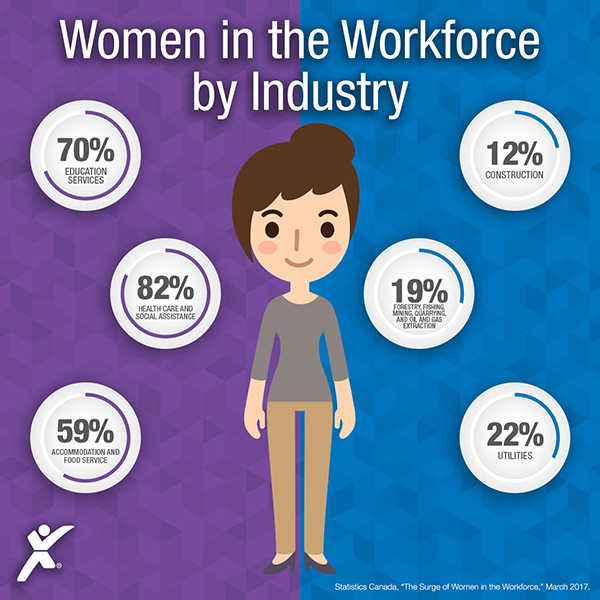Women in the Workplace
TORONTO - November 22, 2017

Women Leaders Share Strategies for Overcoming Challenges and Attitudes
Experts Draw From Personal Experience
Celia Smith knows what it's like for a woman to chart her own path in male-dominated industries. Before she opened her own network of Express Employment Professionals franchises, she spent several years in the military and then worked at aerospace company Lockheed Martin.
"If you go in there and have the skillset and believe it, you can do anything," she said.
 Smith recognizes that women are underrepresented in certain sectors-she cites the skilled trades-but she believes women can overcome those challenges with sheer will. She says she's always been competitive because of her skillset, and encourages other women not to impose limits on themselves.
Smith recognizes that women are underrepresented in certain sectors-she cites the skilled trades-but she believes women can overcome those challenges with sheer will. She says she's always been competitive because of her skillset, and encourages other women not to impose limits on themselves.
Still, according to a March 2017 report from Statistics Canada, the presence of women does not always measure up in certain industries. In 2015, 56.1 per cent of women were employed in teaching, nursing and health-related occupations, social work, clerical, administrative positions, or sales and services; compared to 17.1 per cent of men.
Canadian women are outnumbered in science-based occupations that usually require a university degree. In 2015, only 24.4 per cent of those working in professional scientific occupations were women. After engineering, computer and information systems professionals make up the largest and most unbalanced field in terms of gender (23.1 per cent are women and 76.9 per cent are men).
Overall, the labour force participation of women in Canada has increased considerably since World War II. While more than 80 per cent of women in Canada, ages 25 to 54, participated in the labour market in 2015, women continue to have a lower rate of labour force participation than men, reflecting their greater responsibility for housework and childcare.
They also work fewer hours each week. Women who work full-time are more likely than their male counterparts to experience work absences and interruptions.
Jessica Culo, who owns three Express offices in Edmonton, agrees that women are underrepresented in the skilled trades, and noted that women face unique challenges when applying for jobs, typically related to balancing family demands. Single moms, for example, often have to worry about picking up children from school.
"You don't really see men asking for that," she remarked.
The reasons given by women and men for their work absences differed. Women were more likely to be away from work for involuntary reasons (47.9 per cent)-their own illness, disability, personal or familial reasons, including maternity and parental leave-than men (27.6 per cent). On the other hand, men were more likely to be away from work for other reasons, such as vacation.
Helping employees and potential employees have some flexibility in their schedules can make a world of difference, Culo said. "An hour here or an hour there" can be the difference between a qualified female job candidate being able to take a job or having to turn it down due to other demands.
Culo also points out that it takes longer for women to build trust when surrounded by men, and she encourages other women to find a mentor while also getting out of one's comfort zone. She joined a 150-member entrepreneurs group, where she was one of only eight women. "It's helped me to not be afraid to be creative and to realize there is no ceiling."
"Employers can do their part by offering flexibility and doing so proactively," said Bob Funk, CEO of Express, and a former chairman of the Federal Reserve Bank of Kansas City. "While we've made progress in breaking down barriers, you never want to see the best applicant boxed out of a job just because she has certain expectations or obligations that most male applicants don't. Further, all of us should take it upon ourselves to challenge prevailing notions about where women 'fit' in the workforce. There shouldn't be any limits, and in truth, there aren't-except the ones society and outdated thinking impose."
###
If you would like to arrange for an interview to discuss this topic, please contact Kellie Major at (613) 222-7488 or email kellie@mapleleafstrategies.com.
About Robert A. Funk
Robert A. "Bob" Funk is chairman and chief executive officer of Express Employment Professionals. Headquartered in Oklahoma City, the international staffing company has more than 770 franchises in the U.S., Canada and South Africa. Under his leadership, Express has put more than 6 million people to work worldwide. Funk served as Chairman of the Conference of Chairmen of the Federal Reserve and was also the Chairman of the Federal Reserve Bank of Kansas City.
About Express Employment Professionals
Express Employment Professionals puts people to work. It generated $3.05 billion in sales and employed a record 510,000 people in 2016. Its long-term goal is to put a million people to work annually. For more information, visit
ExpressPros.com.